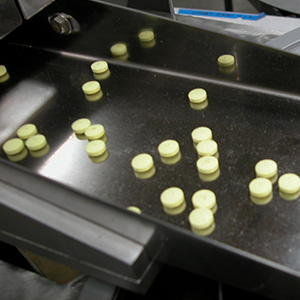There are a vast number of different pharmaceutical products available today, in stores and at the pharmacy. These products are available in many forms ranging from liquids, lotions and creams to powders, tablets, capsules, and pills. Manufacturers of pharmaceutical products use various machines to produce a clean finished product. The machinery used to produce these pharmaceutical products include: cleaning machines, mixing machines, filling machines, capping machines, labeling machines, inspecting machines and other packaging machines. One of the most crucial machines are filling machines, they not only make production more efficient but also more accurate. Before a product gets to a pharmacy, manufacturers of the product must ensure that the contents in the container have the proper dosage, weight or count. Accuracy is very important in the pharmaceutical industry because an improper dosage can render the product to be ineffective, cause bodily harm, or in some cases even be deadly. A good filling machine can provide very high accuracy rates, guaranteeing the consumer gets the proper dosage. Because pharmaceuticals come in a number of forms, different types of automated machines are used. Automated powder filling machines are often used on high value pharmaceutical powders to accurately dispense the proper amount of powder into a container. Automated liquid filling systems are used to accurately fill liquid products into containers.
Fill Pharmaceutical Liquid Products Into Containers
As for tablets, tablet counting and capsule filling machines are used to ensure that the proper quantity is placed into every bottle. This filling equipment can be set to fill a predetermined number of tablets into a container. Other advanced fillers can automatically fill containers with the right amount of product without setting up the quantity. Automated filling systems can also be classified depending on the type of container used. Whether it’s ampoules, bottles, tubes, or vial fillers, there is bound to be a filling machine that’s able to meet the specifications required by a certain pharmaceutical product.
During the filling process, it’s important to ensure that all containers are sterile meaning it must have no dust, metal, glass, or bacteria in it to possibly contaminate the product it’s filled with. Prior to the filling process, production may require a bottle cleaner to effectively remove harmful particles from bottles. After the bottles are properly cleaned they can be filled. Once filled, the next step is to ensure that the pharmaceuticals are tightly sealed by using capping machines.
Because modern filling machines are quickly becoming highly automated, the cost of operation for pharmacy products have greatly been reduced. All this while ensuring that quality is maintained, efficiency is improved. This results in lots of greater production and better profits.
When selecting a machinery manufacturer, pick one with a reputation for producing high-quality, efficient filling machines. The health care industry is home to millions of valuable products. Thus, it only makes sense to invest in the right equipment that fills accurately, performs efficiently, prevents wastage, and seals securely. It also helps if the manufacturer has already had experience providing machinery for other pharmaceutical companies.


